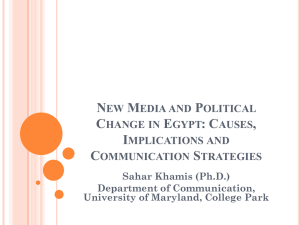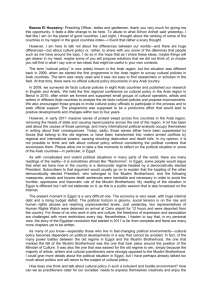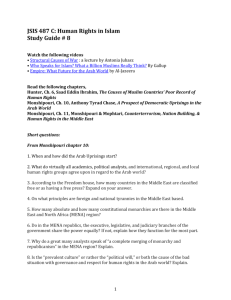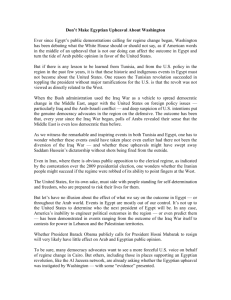Arab Media Influence Report – AMIR 2011
advertisement
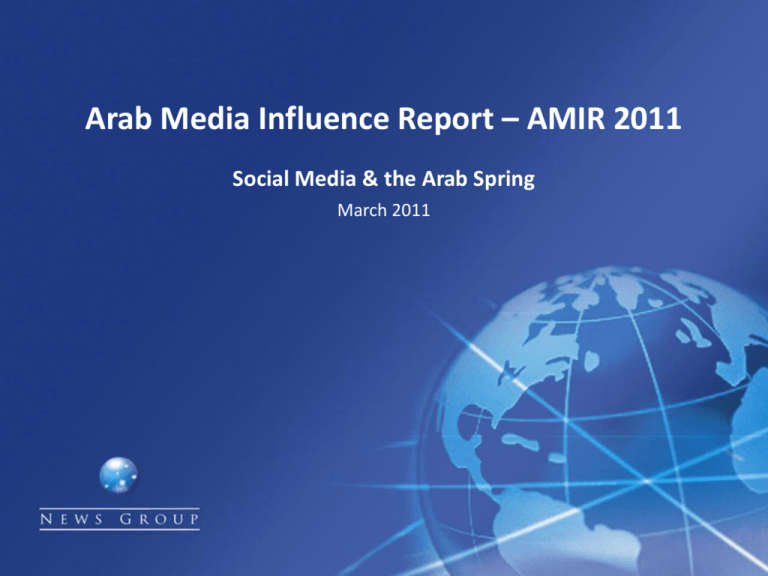
Arab Media Influence Report – AMIR 2011 Social Media & the Arab Spring March 2011 AMIR I in March 2010 identified the following: Egypt fastest growing media market in MENA region New influencers emerging online Yemen had the most political news, UAE had the least political Economic news in Egypt was more dominant than political, in volume Egypt creating a foundation for new media hub MENA Countries largely focus on domestic as opposed to regional issues Social media is about to become a major disruptive force Arab individuals reclaiming authority over their lives, freedom & liberty trends increasing, using social media Baradei’s Facebook page became 2nd most popular site in Egypt and acted as a catalyst to increased anti-government protests in 2010 Facebook playing key role in anti-government protests in Egypt Privatization of media – on the increase Traditional media – on the rise AMIR II (2011) - Focus on Social Media and MENA region Huge growth in SM usage since AMIR I & catalyst in recent events Rapidly growing Internet/social media usage in the region 65 million Internet Users expected to reach 80 million by 2012 30.8% of population (higher than global – 28.7%) User growth from 2000-2010 at over 1,800% Over 17 million Facebook Users In August 2010 – Arabic became fastest growing language on Facebook Decline in traditional media growth around the MENA region Methodology Capture Capture over 10 million conversations / day Alert 1) All user-generated content captured on a 24/7 basis using automated crawlers, this includes blogs, micro-blogs, forums, message boards, news sites, etc. Mine Analyze 2) For political analysis, capture is not keyword based, NG captures all open source data and subscribes to online groups in order to download other data 3) In addition to automated crawlers, researchers download vast amounts of data from all across MENA on a daily basis, using custom-built tools 4) Source databases regularly updated using global references in addition to NG research teams on the ground all around MENA, multiple layers of data reference points Mine 1) NLP technologies used to mine data and extract information 2) Named entities extracted 3) Information clusters created 4) Influencers identified 5) Data Anomalies identified 6) Themes created Methodology Capture Analyze 1. Data analyzed using text mining applications Alert Mine 2. Expert analysts start analyzing data, all using native speakers – Analyze primarily in Arabic, English, French, Farsi, and Urdu 3. Systemized & proprietary methodology used for data analysis 4. Trends documented and tracked based on analysis 5. Influencers documented and tracked based on analysis Alert 1. Alerts sent on pre-defined criteria, either in near-real time, daily, weekly, or monthly Case Study: Egypt Revolution Data Captured Egypt-Related Conversations Volume was at its peak during the month of February. SocialEyez captured a total of 3,306,947 posts/comments 3,306,947 1,736,615 1,624,268 Top Languages 9% January February March 10% 38% Top Sites: 11% •Facebook & Twitter •Masrawy •Youm7 •Eqla3 •Ikhwanbook English Arabic Farsi Other 32% French Change – Through Social Media “The two wings of the Egyptian revolution only worked together in harmony with the help of social media platforms of communication. They were disconnected before and just managed to coordinate their thoughts, demands, and actions, and this was mainly through the social media networks.” Year 2008 Issue of privatization rises again. Thousands of workers rejected the plans of the authorities and planned a protest one of the largest workers strikes in Egypt Demands included urging the Government to own national industries rather than privatizing such establishments Effect on social media: the April 6th movement came alive on Facebook. The event played an important part in supporting and shaping the Egyptian revolution. Socio-economical demands at its rise. Year 2010 Killing of 28year young business man Khalid Said Thousands of users on social media respond to the killing of Khalid Said. News of a protest surfaced on Social Media Demands included end of emergency law, raising minimum wages, increasing government subsidy on basic food and commodities etc. Effect on social media: the formation of “We are all Khalid Said” Facebook page. A page created to address the various political demands of the public. A page that contributed to a President of 30 years to step down. Were there warning signals in Egypt? Fever of the Tunisian revolution spreads among the Egyptian public, amid calls by many Egyptians to stage a revolution on January 25. Facebook users in Egypt continue to discuss holding a revolution on Jan 25th with the aim of demanding improving the citizens’ conditions. 27,810 Egyptians anticipate the popular sit-in on the Day of Anger on the streets amid security enforcements for fear of chaos in the country. Following the incident in Tunisia, an Egyptian man sets himself on fire outside the main gate of the parliament. Two similar incidents followed on the 19th. 36,270 44,664 January 25 (Police Day) is the confirmed date for the Egyptian popular uprising, to protest the poor living conditions in the country. Egyptian people still contemplate a possible public revolution on January 25. 278,186 137,486 Tipping point from socio-economic to political 38,086 11,682 1/16/2011 1/17/2011 1/18/2011 1/19/2011 1/20/2011 1/24/2011 1/25/2011 Calls for the January 25th revolution became the 4th most discussed subject on social media across the entire Arab world” on January 20th Shift from Socio-Economic to Political Terms In Q 1 2010 57% of Arabic conversations on social media included socio-economic terms, this number drops to 37% in 2011. Revolution Freedom Corruption Income Political Salary Jobs SocioEconomic Parliament Mubarak NDP Police Brutality Minister Minimum Wage Corruption Housing In Q 1 2010 35% of Arabic conversations on social media included political terms, this number increases to 88% in 2011 The Egyptian revolution – 2011 Political Economic 32% 68% Top Public Demands 450,000 400,000 No. of posts/comment 350,000 300,000 250,000 200,000 150,000 100,000 50,000 0 Oust Interior Minister Increase Min Wages End Emergency Law Oust Mubarak Increase Gov Subsidies Fair Elections Disolve Parliament Key Trends – Post Mubarak The Egyptian revolution – 2011 Public Reactions to Government’s Response Reactions to Shafiq as PM Reactions to Sharaf as PM 15% 42% 58% Positive Negative Approval of Muslim Brotherhood Members on Constitutional Reform Committee Positive 85% Negative Reactions to Government Economic Announcements 15% 40% 60% 85% Approve Positive Dissaprove Negative Neo-Socialism Trend 70% of online conversations directly called for a larger economic role by the government Term February 2011 Mentions % Increase from January Salary increase 1.2 million 63% Food subsidies 800 k 54% Job creation 1.5 million 46% Public healthcare 700 k 21% Sample Verbatim: "I say no to privatization, and I call on the government to cancel it at all as it does not work for our interests. The state has to support its development institutions and do without any foreign aids. " "This is privatization: the government sells its properties, which are originally owned by the people, at very low prices for the interest of a bunch of corrupt people. Privatization means stealing the money of the people.“ "Desert lands in Egypt are large and abundant, and it is our rights as lower-income people to have wide and beautiful apartments with green areas around. “ Increased Role & Influence of Muslim Brotherhood * 60% of online conversations cite the Muslim Brotherhood as the key force that “enabled” the Jan 25th revolution Acceptance of MB being part of Constitutional Change Committee Accept Don't Accept 20% 80% "The MB young people protected the revolution in Tahrir Square by their bodies. They managed with all Egyptians to make the revolution succeed." Link: http://www.youtube.com/watch?v=4FeuU74 b4fw "I'm looking forward to seeing the day when this new party becomes reality.“ Link: http://www.facebook.com/7oria.we.3adala Increased Role & Influence of Muslim Brotherhood Political Conversations Mentioning MB in 2010 Mention Don't Mention 48% 52% Political Conversations Mentioning MB in 2011 Mention Don't Mention Mentions of the Muslim Brotherhood increased by 26%, but support from MB only increased by 8% from 2010-2011 22% 78% Sentiment Towards the US & Israel 2010 Sentiment Towards the US 2011 Sentiment Towards the US 27% 35% 43% Positive Neutral Negative 22% 10% 63% Positive Neutral Negative 2010 Sentiment Towards Israel 2010 Sentiment Towards Israel 2% 1% 7% 14% 84% Positive Neutral Negative 92% Positive Neutral Negative Support Salafi Involvement in Politics 40% 60% Support Refuse Emergence of strong Salafi Movement led by Sheikh Mohamed Hassan Salafi scholars called on their followers to vote “yes” for the constitutional amendments Sheikh Mohamed Hassan’s visit to Ain Shams University Verbatim – support for Sheikh Mohamed Hassan "You are the crown of our heads oh Sheikh Mohamed Hassan, and you are a model for the Muslim Nation. I love you so so so much. May Allah grant you good health, long life and wisdom“ "Sheikh Hassan, you are the lion of Mosque platforms. I swear by God I love you man. You are the most knowledgeable man now on this earth.“ "I love you Sheikh Mohamed. You Scholars are right and I want to join the Salafi movement. You people are of good manners, and I love you." "Tanta University is inviting you. I ask Allah to bless you all scholars of this Muslim Ummah (nation). You are the only one that touched my heart with your very soft words that tell us about God. I hope you Sheikh visit us at the Tanta (City) University. “ The Disconnect – between the Elite & the Masses Optimism towards the revolution is declining as the youth seem to disintegrate on issues that initially integrated them. 25% drop Religious influence emanating from groups inspired by the Salafi movement and the Muslim brotherhood is on the rise. Key Findings 1. Social media is a key driver, was game changer in Egypt primarily because it bridged the gap between social classes thus for the first time creating a much larger united anti-government front that included rich & poor 2. Freedom of expression on social media was catalyst, “political” terms clearly on the rise in 2011 vs. 2010 Key Findings 1. Socio-Economic: neo-socialism 2. Political: domestic is priority (Israel & USA mentions on decline but more negative) 3. Religious: Brotherhood & Salafism on the rise The Arab Region – a Pan Arab Outlook Countries in Focus The key public demands prevailing on social media can be broadly classified into two main categories , Political and Socio-Economic: Political - Tunisia - Egypt - Libya - Yemen - Syria - Jordan Socio-Economic - Kingdom of Saudi Arabia - Oman - Jordan - Morocco - Algeria Algeria Libya Egypt KSA Yemen User Emotions – the Region User Emotions – Egypt User Emotions – Libya Hatred/anger: toward “Ruling National Democratic Party’s leaders” Anger/hatred: toward “Gaddafi” 100% 90% 100% Sadness: toward “Libyans” 90% 80% 60% 50% Anger: toward “Habib AlAdly” (Interior Minister) 70% Sympathy: toward “protesters” 60% 70% Resentment: toward “Mubarak” 80% Admiration: toward Wael Ghoneim” 50% Admiration: toward “AlJazeera” Anger: toward “Libyan media” Hate: toward AlQaeda” User Emotions – the Region User Emotions – Saudi Arabia User Emotions – Yemen Anger: toward “President Ali Saleh” Love: toward “Abdullah bin Abdul Aziz” 100% 100% 90% 90% 80% 80% 70% 70% Hatred: toward “Shiites in Easter Province” 60% 60% 50% 50% Resentment: toward “Protests” Anger: toward “USA” Sympathy: toward “Protesters” Future Trends A United Dream – the Arab Union – Myth or Reality? The Arab Union, it is a dream many social media users voiced after the spark of the Arab revolutions. Many users think that the Arab region will be ripe for a union that ends years of unjustified split and disagreement. They claim that the dream of unity existed ever since Egyptian former president Naser called for it, but they think that their weak leaders were the obstacle before such an aspiration. This trend may not be that strong today, but it has many supporters that hope first that the other dictator regimes fall, which will pave the way for such a dream to come to the surface again. After the revolution, a number of social networks (mainly Facebook) were opened by some Arab unity fans to support revolutions everywhere in the Arab world. A User comment: “The Arab world peoples are looking forward to the unity of their countries for the betterment of their conditions. As the European managed to have their EU, the Arab also can work for the AU after the Arab despots leave and the Arabs become free and democratic” User emotions towards Political leaders in the Region Qaboos bin Said Al Said Hosni Mubarak Abdullah bin Abdul Azaz Al Saud Ali Abdullah Saleh Abdullah II Hamad bin Issa Al Khalifa Abudl Azaz Bouteflika Bashar Al-Assad Zine el-Abidine Ben Ali Muammar Al-Gaddafi Key Findings & Predominant Conversational Trends across the MENA region Neo-Socialism trends across the Arab world Growing influence of religious groups on politics Key Findings & Predominant Conversational Trends across the MENA region Neo-Socialism trends across the Arab world Public calling for larger government role in economics/business Public calling for increase in government jobs Public calling for increase in government subsidies Public widely opposed to privatization plans Public calling for nationalization of large corporations (Egypt only) 70% of online conversations directly called for a significantly greater role by their governments Key Findings & Predominant Conversational Trends across the MENA region Growing influence of religious groups on politics Muslim Brotherhood growing increasingly influential, but remains a small fraction of overall conversation (Favorable mentions vary between 8-26% per country) Salafi movement growing increasingly influential Muslim Brotherhood to form political party in Egypt, but not other countries Increased ties between Saudi religious influencers & regional Islamic organizations Influential Islamic scholars more active on social media, compared to moderate secular influencers – religious figure vie for media influence Future Trends to Monitor Neo-Socialism trends across the Arab world Growing influence of religious groups on politics Increasing popularity of the Salafi movement in rural areas of Arab society Continued awakening of the Arab consciousness in realizing their role in society Need for Arab Unity to drive growth and development Syria, Morocco, Algeria remain high oppressed societies with increasing calls for freedom Shift in International policies: freedom includes freedom from external influences, dependency on aid, etc. Education, technology empowered the youth lead these revolutions Arab Media Influence Report 2011 www.newsgroupholding.com
